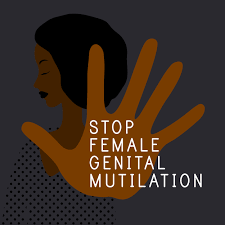The most common problem are :
- Difficulties in pregnancy and childbirth.
- Urinary infections.
- Vaginal infections.
- Painful periods.
- Problems with sex.

FGM is defined as all procedures that involve partial or total removal of the female
external genitalia or other injury to the female genital organs whether for cultural,
religious or other non-therapeutic reasons. (WHO, 2001). It ranges from being very
simple to the radical form of FGM and it is carried out at any time between birth and
puberty.
FGM is most widely practised across 30 countries in Africa.
This includes: Ethiopia, Eritrea, Sudan, Somalia, Nigeria, Mali and Djibouti.
FGM is also practised in countries outside Africa including Egypt, Indonesia,
Malaysia, Yemen and Iraq.
Girls and women who have undergone FGM are from a variety of religious
backgrounds; they are affected as this is a social and not a religious custom.
FGM pre-dates Islam by many centuries.
FGM is a strong custom and tradition. However, this custom is against the law in the
UK and many other countries.

FGM Type 1 :
Clitoredectomy/Sunna: Partial or total removal of the clitoris (a small sensitive and
erectile part of the female genitals) and rarely, the prepuce (the fold of the skin
surrounding the clitoris) as well.
FGM Type 2 :
Excision: Partial or total removal of the clitoris and the labia minora with or without
excision of the labia majora. The labia are “the lips” that surround the vagina.
FGM Type 3 :
Infibulation: Narrowing of the vaginal opening through the creation of a covering
seal. The seal is formed by cutting and repositioning the inner and sometimes outer
labia, with or without removal of the clitoris.
FGM Type 4 :
Other: All other harmful procedures to the female genitalia for non-medical
purposes, e.g. pricking, piercing, incising, scraping and cauterizing the genital area.

Short Term Complications of FGM :
Haemorrhage, Shock, Acute urinary retention, Damage to other organs, Infection, Failure to heal, Death.
Long Term Complications of FGM :
Difficulty passing urine, Urinary tract infection, Difficulties with menstruation, Chronic pelvic infection, Infertility,
Vulva abscess/cyst/calculus, Neuroma, Keloid scaring, Fistula, Increased risk of perineal trauma, haemorrhage and perinatal death.
We are here to help women who have undergone FGM and are experiencing problems.
- Difficulties in pregnancy and childbirth.
- Urinary infections.
- Vaginal infections.
- Painful periods.
- Problems with sex.
- All female team to take care of you.
- Someone to listen to you.
- Holistic care.
- Individual counselling.
- General gynaecological advice.
- Project manager/health promotion and advocacy.
- Specialist Midwife.
- Support Worker.
- GUM clinic.
- Psychologist.
- Translator.
- Health Visitor.
- GP.
- Urologist.
- Public Health Consultant.